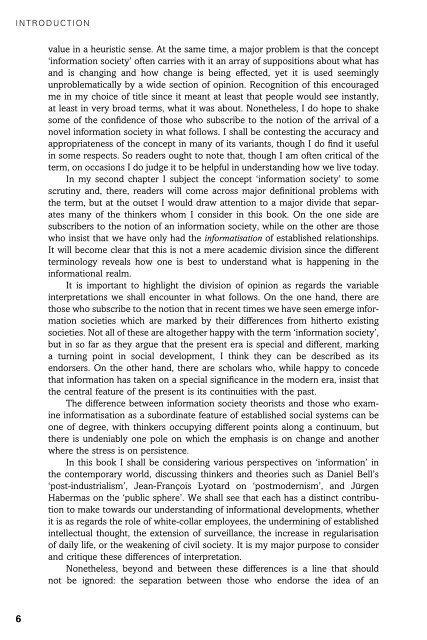Theories of the Information Society, Third Edition - Cryptome
Theories of the Information Society, Third Edition - Cryptome
Theories of the Information Society, Third Edition - Cryptome
Create successful ePaper yourself
Turn your PDF publications into a flip-book with our unique Google optimized e-Paper software.
INTRODUCTION<br />
value in a heuristic sense. At <strong>the</strong> same time, a major problem is that <strong>the</strong> concept<br />
‘information society’ <strong>of</strong>ten carries with it an array <strong>of</strong> suppositions about what has<br />
and is changing and how change is being effected, yet it is used seemingly<br />
unproblematically by a wide section <strong>of</strong> opinion. Recognition <strong>of</strong> this encouraged<br />
me in my choice <strong>of</strong> title since it meant at least that people would see instantly,<br />
at least in very broad terms, what it was about. None<strong>the</strong>less, I do hope to shake<br />
some <strong>of</strong> <strong>the</strong> confidence <strong>of</strong> those who subscribe to <strong>the</strong> notion <strong>of</strong> <strong>the</strong> arrival <strong>of</strong> a<br />
novel information society in what follows. I shall be contesting <strong>the</strong> accuracy and<br />
appropriateness <strong>of</strong> <strong>the</strong> concept in many <strong>of</strong> its variants, though I do find it useful<br />
in some respects. So readers ought to note that, though I am <strong>of</strong>ten critical <strong>of</strong> <strong>the</strong><br />
term, on occasions I do judge it to be helpful in understanding how we live today.<br />
In my second chapter I subject <strong>the</strong> concept ‘information society’ to some<br />
scrutiny and, <strong>the</strong>re, readers will come across major definitional problems with<br />
<strong>the</strong> term, but at <strong>the</strong> outset I would draw attention to a major divide that separates<br />
many <strong>of</strong> <strong>the</strong> thinkers whom I consider in this book. On <strong>the</strong> one side are<br />
subscribers to <strong>the</strong> notion <strong>of</strong> an information society, while on <strong>the</strong> o<strong>the</strong>r are those<br />
who insist that we have only had <strong>the</strong> informatisation <strong>of</strong> established relationships.<br />
It will become clear that this is not a mere academic division since <strong>the</strong> different<br />
terminology reveals how one is best to understand what is happening in <strong>the</strong><br />
informational realm.<br />
It is important to highlight <strong>the</strong> division <strong>of</strong> opinion as regards <strong>the</strong> variable<br />
interpretations we shall encounter in what follows. On <strong>the</strong> one hand, <strong>the</strong>re are<br />
those who subscribe to <strong>the</strong> notion that in recent times we have seen emerge information<br />
societies which are marked by <strong>the</strong>ir differences from hi<strong>the</strong>rto existing<br />
societies. Not all <strong>of</strong> <strong>the</strong>se are altoge<strong>the</strong>r happy with <strong>the</strong> term ‘information society’,<br />
but in so far as <strong>the</strong>y argue that <strong>the</strong> present era is special and different, marking<br />
a turning point in social development, I think <strong>the</strong>y can be described as its<br />
endorsers. On <strong>the</strong> o<strong>the</strong>r hand, <strong>the</strong>re are scholars who, while happy to concede<br />
that information has taken on a special significance in <strong>the</strong> modern era, insist that<br />
<strong>the</strong> central feature <strong>of</strong> <strong>the</strong> present is its continuities with <strong>the</strong> past.<br />
The difference between information society <strong>the</strong>orists and those who examine<br />
informatisation as a subordinate feature <strong>of</strong> established social systems can be<br />
one <strong>of</strong> degree, with thinkers occupying different points along a continuum, but<br />
<strong>the</strong>re is undeniably one pole on which <strong>the</strong> emphasis is on change and ano<strong>the</strong>r<br />
where <strong>the</strong> stress is on persistence.<br />
In this book I shall be considering various perspectives on ‘information’ in<br />
<strong>the</strong> contemporary world, discussing thinkers and <strong>the</strong>ories such as Daniel Bell’s<br />
‘post-industrialism’, Jean-François Lyotard on ‘postmodernism’, and Jürgen<br />
Habermas on <strong>the</strong> ‘public sphere’. We shall see that each has a distinct contribution<br />
to make towards our understanding <strong>of</strong> informational developments, whe<strong>the</strong>r<br />
it is as regards <strong>the</strong> role <strong>of</strong> white-collar employees, <strong>the</strong> undermining <strong>of</strong> established<br />
intellectual thought, <strong>the</strong> extension <strong>of</strong> surveillance, <strong>the</strong> increase in regularisation<br />
<strong>of</strong> daily life, or <strong>the</strong> weakening <strong>of</strong> civil society. It is my major purpose to consider<br />
and critique <strong>the</strong>se differences <strong>of</strong> interpretation.<br />
None<strong>the</strong>less, beyond and between <strong>the</strong>se differences is a line that should<br />
not be ignored: <strong>the</strong> separation between those who endorse <strong>the</strong> idea <strong>of</strong> an<br />
6
















